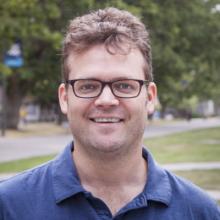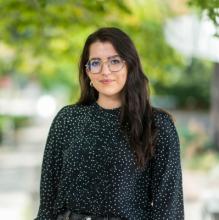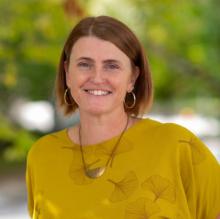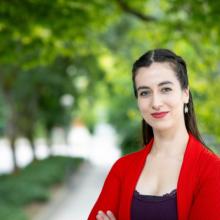How can we help parents build the emotional resilience needed to experience parenthood as a period of growth and thriving instead of overwhelming stress and burnout? Angela's research focuses on happiness and self-compassion as factors for promoting emotional resilience in parenthood.
Research Description
Parenthood can be both rewarding and challenging. While some parents report reduced well-being and decreased life and marital satisfaction, others find enhanced feelings of meaning and reward with parenthood. How can we help parents build the emotional resilience needed to experience parenthood as a period of growth and thriving instead of overwhelming stress and burnout? My research focuses on happiness and self-compassion as factors for promoting emotional resilience in parenthood. Emerging research suggests that engaging in intentional activities can enhance one’s level of happiness, which is associated with successful relationships and better physical and mental health. At the same time, when parenting challenges lead to feelings of frustration or shame, self-compassion practices can reduce negative affect and increase well-being. In consultation with parents and frontline staff of community organizations, I am developing two self-care interventions (focusing on either happiness or self-compassion) which will be evaluated using a randomized controlled trial (RCT) for their relative efficacy in influencing parental efficacy and well-being, and improving parent-child relationship and satisfaction.
What does being a Public Scholar mean to you?
Public scholars believe that scholarship is not done in isolation from real life, but in interaction with it. As a public scholar, my research is driven by questions that emerge from working with families and understanding challenges to their mental and emotional well-being. I endeavor to increase understanding and inspire growth by undertaking and mobilizing research in ways that are meaningful to the communities I serve, and to advocate for them. Research shows that disparities in happiness and mental well-being of individuals are not just determined by external factors, but can be the result of developmental trajectories set in place by adverse, or empowering, childhood environments. For me, then, public scholarship includes actively connecting with organizations that support children and their families, and collaborating with them to develop and test solutions that can promote the emotional resilience of the adult caregivers so that they can provide the warm and caring environments within which children can thrive.
In what ways do you think the PhD experience can be re-imagined with the Public Scholars Initiative?
The PSI has created space for a genuine exploration of how the journey of undertaking a PhD degree can best serve the individual, communities of interest, as well as the academic field. It has been exciting to learn how other public scholars have found ways to make their PhD experiences meaningful and less isolating, and the dissemination of their research more palatable and impactful in the real world. I have been regularly doing presentations, facilitating workshops and helping to develop resources for local family support organizations, work that was regarded to be apart from my academic work. The PSI validates such public engagement work to be contributions to, rather than distractions from, doctoral work, by supporting the researcher’s capacity to learn from and give back to communities of interest. With PSI support, I can finish my doctoral journey not just with a thesis, but also having broader and stronger ties with related organizations, and tangible resources that are developed for the communities I work with.
How do you envision connecting your PhD work with broader career possibilities?
Collaborating with community partners for my PhD dissertation is teaching me a lot about knowledge translation, navigating between cultures and building trusting relationships, skills that are essential for a career that bridges science and practice. Conducting my doctoral study within communities helps enhance my visibility and reputation on the ground, and begin the establishment of a sphere of influence for me in my field. I envision that my PhD work is the first drop that causes ripples, opening the door to opportunities for working alongside decision and policy makers, where I can more strongly advocate for processes and programs that prioritize the mental well-being of parents and empower them with resources needed to thrive in the caregiving role.
How does your research engage with the larger community and social partners?
In my research with parents of young children in Vancouver, I investigate, develop and test interventions that help to promote emotional resilience and parenting efficacy in the first few years of parenthood. I collaborate with four district-wide childcare program providers who share my belief that the promotion of resilience, well-being and healthy relationships should be a priority, and a worthwhile investment for preventing the mental health challenges that are increasingly prevalent today. In consultation with the managers, frontline staff and parents that use their services, I am developing two distinct self-care programs (one on cultivating happiness, and the other on self-compassion) that will include psychoeducational sessions, practices and tools that will be provided to these communities, and evaluated as part of a randomized controlled trial. Support from the Public Scholars Initiative extends this project to include the publication of a collection of “happiness moments” generated by participants, that is hoped to further inform and inspire families in these communities.
Why did you decide to pursue a graduate degree?
For ten years prior to starting my graduate studies, I had a consulting practice working with large organizations to integrate emotional intelligence into their culture and processes, and taught numerous emotional intelligence workshops. I was passionate about my work, but also saw its limitations. I was especially intrigued by the fluidity of one’s level of emotional intelligence across contexts, particularly when it came to the parenting role. I decided that focused academic study is required to help me deeply understand this construct of emotional intelligence, so I can better support others in growing emotional competencies that are stable and resilient to adversity.
Why did you choose to come to British Columbia and study at UBC?
I chose British Columbia because this is a vibrant hub for the social and emotional learning (SEL) movement, and UBC because of my department’s excellent scholarship, and faculty who are committed to moving the field ahead. I am especially grateful to my supervisor Dr. Shelley Hymel, for her keen guidance and warm mentorship.
Public scholars believe that scholarship is not done in isolation from real life, but in interaction with it. As a public scholar, my research is driven by questions that emerge from working with families and understanding challenges to their mental and emotional well-being.




